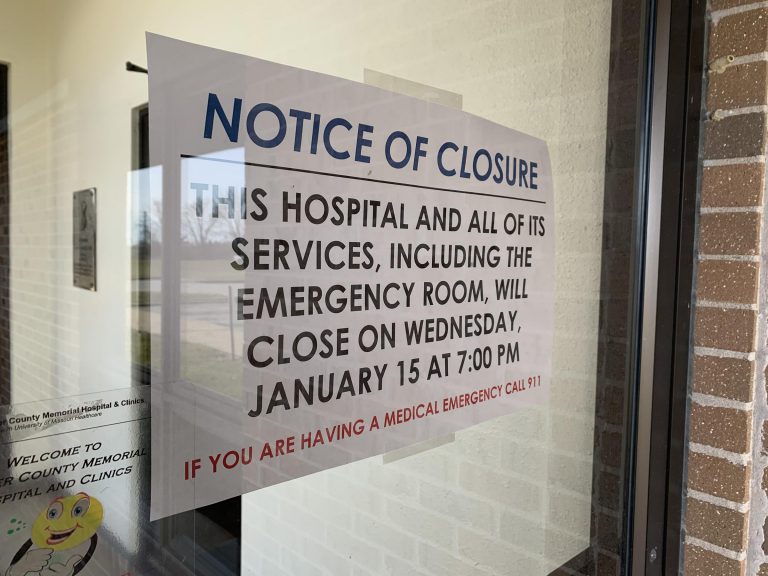It’s a cold and windy January morning in Boonville, Mo., and Thomas Talent has driven close to an hour to Pinnacle Regional Hospital for an appointment. The only problem: the hospital closed suddenly the day before.
Talent didn’t find out until he saw a sign on the door saying, “This hospital and all of its services, including the emergency room, will close on Wednesday, if you are having a medical emergency, call 911.”
“It’s a long drive for us and nobody let us know anything,” Talent said. “I got ‘em on the phone and they said that they’ve closed down, didn’t say why.”
In a news release, the Kansas City-area Pinnacle Healthcare System said the costs of bringing the 46-bed hospital into compliance with state regulations were too high. The company declined to talk more about it.
The closing is a blow to Boonville, a town of 8,000 that overlooks a bend in the Missouri River. It’s named after two of Daniel Boone’s sons who ran a business in the area. And it’s had a hospital for more than 100 years.
Talent says a hospital representative told him they’d send through his prescriptions, but he can’t afford to wait long.

“I’m a severe diabetic, I’m out of my diabetic medicine,” he said. “I have sciatica on both sides, I’m in a lot of pain. My pain prescriptions, I have no more re-fills on those.”
Other patients, like 84-year-old Jim Farris, showed up to pick up medical records at the hospital’s emergency rooms. He said, “I don’t know what I’m going to do for a doctor after, it’s all up in the air. This might be a good idea to get this Pinnacle off the city limits of Boonville.”
Pinnacle Healthcare took over the hospital in late 2018. Early this year, Pinnacle announced the hospital would no longer offer lab testing or new direct admissions due to regulatory issues.
Jesse Trigg worked as a radiology tech at the hospital for the last six months. He says there were rumors in the days before the closure.
“Management was saying, ‘No, no, we’ve got the things in line that we need to get taken care of,’ and all that. And, ‘We’re going to push forward with getting repairs made that need to be made to keep everything going,'” Trigg said. “And then the next morning, got up and, hey, you’re closed.”
Dave Dillon of the Missouri Hospital Association says every hospital is different, in terms of its finances, but there are challenges rural hospitals have in common. Across the board, they are struggling for many of the same reasons as their communities: an aging population, higher rates of poverty and geographic isolation. That often leaves these hospitals operating with tight profit margins, or at a loss.
Nationwide, 197 rural hospitals have closed since 2005.
“What we have found is just less than 50 percent of rural hospitals are operating in the red,” Dillon said. “And in the long run, that’s truly not sustainable.”
In Missouri, six rural hospitals closed in the last five years. It’s part of a group of states that have seen higher rates of closures — states that haven’t expanded Medicaid. The hospital association is supporting an initiative to get expansion on the ballot in November.
Researchers have found that Medicaid expansion is linked to better financial health for rural hospitals. More people qualifying for Medicaid means hospitals get more reimbursements for care they provide.
George Pink, a University of North Carolina professor who studies rural hospital finance, says closures affect towns in a number of ways, from contributing to unemployment to scaring off new businesses.
He cautions that while Medicaid pays more than uninsured patients, who might not pay at all, it’s often still less than the services cost. When you add in the costs of maintenance, Pink says it’s not uncommon for hospitals to fold.
“It costs a lot of money to maintain a technologically up to date and a physically safe environment for hospital,” Pink said. “If you haven’t got the money to do that, then it’s not surprising that a hospital might have to close for those reasons.”
Boonville residents now face drives of half an hour or more to get care, and local officials have raised concerns over ambulance response times. The community faces the same dilemma as many other rural towns across the country: how to live without a hospital.

